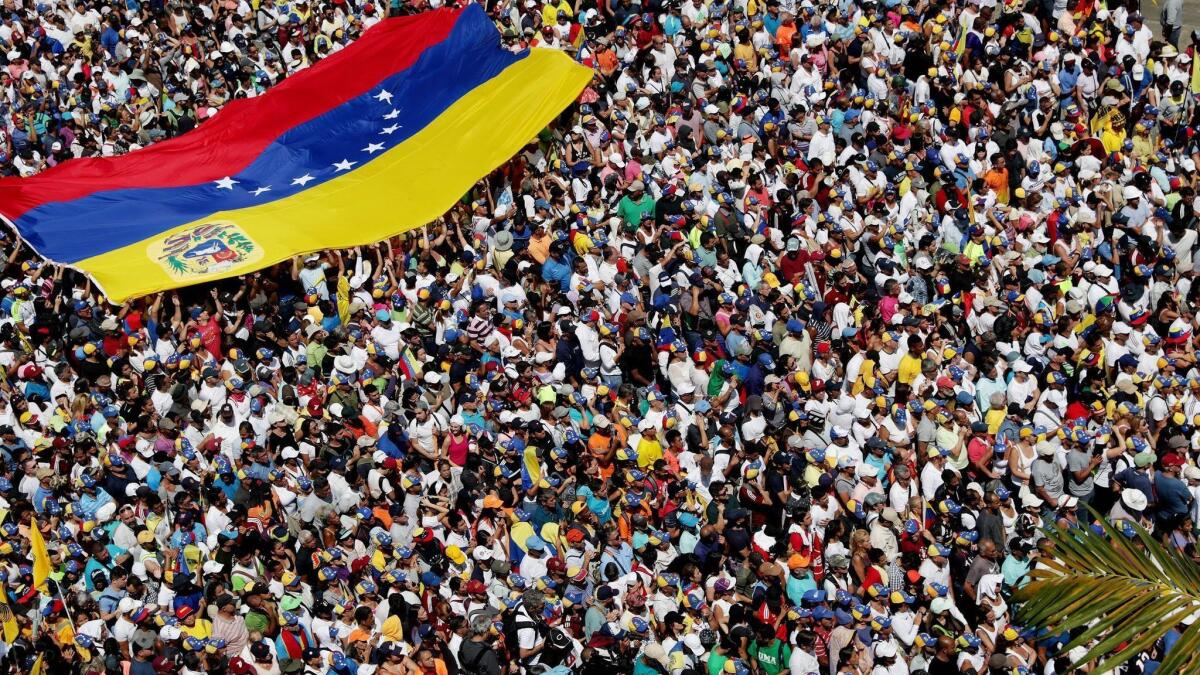Tens of thousands in Venezuela take to the streets as political crisis escalates

- Share via
Reporting from CARACAS, Venezuela- — An air force general announced his defection from the embattled government of Venezuelan President Nicolas Maduro on Saturday, as huge crowds of opposition supporters rallied to demand that Maduro resign.
Maduro countered that the Trump administration is seeking to install a “puppet government” in Caracas.
The large-scale anti-government protests came in response to a call from Juan Guaido, the opposition legislator who last week denounced Maduro as a “usurper” and proclaimed himself the country’s interim president — a position backed by the United States and other nations.
The proclamation set off the latest round of Venezuela’s long-running political turmoil.
“We will remain in the streets until achieving the liberty of Venezuela,” Guaido vowed to protesters. “The people of Venezuela have decided to be free.”
The protests appeared peaceful, and by late afternoon, marchers were leaving the streets.
While repudiating Maduro’s rule, Guaido has no power to direct state agencies — and the Maduro government says it has frozen his bank accounts.
Nonetheless, Guaido vowed Saturday that the opposition would soon begin organizing distributions of humanitarian aid in a country that has long suffered from shortages of food and medicines.
The opposition blames the shortages and ongoing hyper-inflation on the Maduro administration’s ineptitude and corruption, while Maduro cites a U.S.-backed “economic war” against his socialist government.
Meanwhile, the opposition hailed the public defection Saturday of Air Force Gen. Francisco Yanes Rodriguez, the first reported high-level defection since Guaido named himself acting president Jan. 23.
In a video circulating on social media, Yanes denounced Maduro as a “dictator,” recognized Guaido’s interim rule and called on fellow officers to do the same.
The Venezuelan Air Force high command promptly denounced Yanes as a traitor.
In a Twitter message on Saturday, John Bolton, President Trump’s national security advisor, said that Washington “calls on all military members to follow General Yanez’s lead, and to protect the peaceful protesters supporting democracy.”
The Venezuelan military’s top brass has said that it remains behind Maduro, providing a critical pillar of support for the president.
Maduro has been visiting military bases in recent days and warned that the country faces possible “aggression” from the United States.
On Saturday, Maduro publicly commemorated the 20th anniversary of the 1999 presidential inauguration of the late Hugo Chavez, Maduro’s socialist mentor and a longtime U.S. antagonist.
Supporters at a pro-government rally responded “No!” in unison as Maduro asked if they wanted to be converted into “slaves of Washington.”
The president also announced that some 20,000 to 30,000 pro-government militia members would be incorporated into the National Guard in what he called a bid to bolster the country’s defense.
The Maduro administration — which retains a core support in Venezuela — has remained in office despite many previous large-scale demonstrations, some of which turned violent and resulted in clashes and deaths. But Maduro faces more international pressure than ever now as Washington has increased economic sanctions against the Venezuelan government.
Maduro has refused to resign and has called the opposition move a U.S.-led plot to unseat his socialist government illegally and grab the country’s vast petroleum riches.
Maduro won reelection last year in balloting largely boycotted by the opposition, which called the results fraudulent. The government says the voting was clean, and Maduro won in a landslide.
The Trump administration has backed the opposition and joined in calls for Maduro to stand down.
The opposition — and the United States — have rejected calls by some countries for negotiations with Maduro’s government. The opposition has made three major demands: the resignation of Maduro, appointment of a “transitional” government, and new elections.
Maduro has told Russia media that he was ready to talk to the opposition but said he would not agree to new elections.
Venezuela’s long-fragmented opposition appears to have unified behind the figure of Guaido, a 35-year-old industrial engineer and federal lawmaker who was little known here until he declared himself acting president last week.
The conflict has become the latest geopolitical battleground between Washington and Moscow. Russia and China, major lenders to the Maduro government, have backed Maduro in the conflict .
Mogollon is a special correspondent. Times staff writer Patrick J. McDonnell contributed to this report.
Twitter: @PmcdonnellLAT
More to Read
Sign up for Essential California
The most important California stories and recommendations in your inbox every morning.
You may occasionally receive promotional content from the Los Angeles Times.










